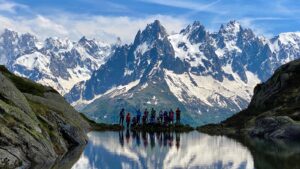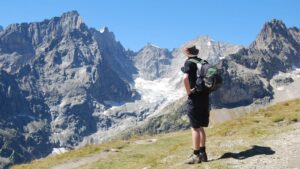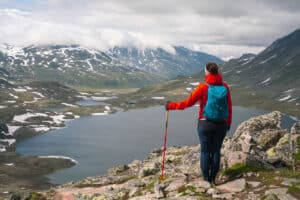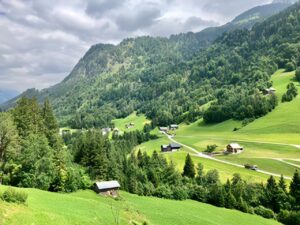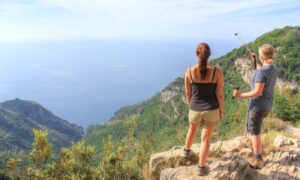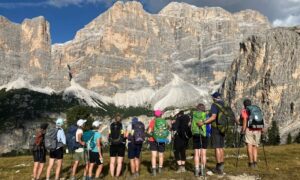Choose your trek
Select your trek and check availability, either by phoning us or sending an on-line enquiry.

The spine of the Pyrenees marks the border between France and Spain and offers some wonderful trekking along relatively quiet trails. Our trek takes us along the middle section of the mountain range from east to west. We hike along the French GR10 and then cross into Spain and on to the Spanish GR11 leading into the spectacular Ordesa Canyon. The people are proud Pyreneans living in pretty towns and hamlets with ancient churches. The trekking is challenging with varied scenery, rivers and lakes, thick deciduous forests and high arid mountains.
Challenging+
Regional Pyrenean specialties from France and Spain
Comfortable 2-3 hotels and mountain refuges
Experienced International Mountain Leaders
Personalised trekking with 6-14 hikers
All scheduled treks will run with our minimum group size
A trek along France's GR10 and Spain's GR11
Meet at Toulouse Blagnac Airport at 13:00 hrs (1pm). We will then transfer you by road to our hotel in Bagnères-de-Luchon. The trip takes just under 2 hours.
Luchon is a spa town at 625m above sea level and the healing powers of the thermal waters were known to the Romans. The town is pretty and there is a lovely main street with shops, cafés, and restaurants.
Famed for its incredible steep rocky cirque, Gavarnie is a great place to spend the day, though it can get busy in the village during the daytime.
The Ordesa Canyon has huge, steep rock walls and a river flowing at the bottom of it. The scenery is outstanding, making it a very special place and a highlight on our journey.
After breakfast, we transfer in 3 hours to Toulouse Blagnac Airport by private bus. We aim to arrive before 1pm (13:00 hrs).
This map is for illustrative purposes only.
The route is approximately 120km/75 miles and is quite tough as there are some big ascents and descents. This trip should appeal to you if you regularly take walking weekends and are happy covering 15-21km (10-14 miles) each day, with a number of ascents and descents over varying terrain. On this trek in the Pyrenees we normally walk for between 6 and 8 hours each day and be outdoors for 8 or 9 hours. Some of the trails are on good, well-maintained paths though there are sections when it is rocky and loose underfoot. In other places there are only feint paths. There is a short climb up a mountain stream and you might get slightly wet feet.
The Pyrenees Traverse is a challenging trek suitable for fit hikers with previous experience doing challenging multi-day hikes in the mountains. Typical days involve:
The Pyrenees Traverse is a bit more strenuous than the Tour du Mont Blanc, with longer days, more ascent/descent, and three refuge nights without access to your main luggage.
The terrain itself is not technical, but some of the paths are feint, steep and can be rocky underfoot. Hiking boots are essential.
Our Pyrenees Traverse is graded 4 (Challenging+), a step up from the TMB in difficulty. The hiking days are longer, the elevation gains/losses are greater, and the terrain is rougher than on many other well-known European treks.
Days are typically 8-9 hours on the trail, with daily ascents/descents of 800-1400m. You'll cover 15-21km per day, hiking at altitudes between 8000-2500m. The terrain is varied, ranging from well-travelled trails to rocky and uneven paths with rocky steps and some paths that are very feint. You need to be confident of your fitness.
As you will trek to higher altitudes the effect of any poor weather will bring cold wind and rain.
While you only need to carry a daypack, there are 4 nights (days 2, 5, 8 and 9) without your main luggage so you'll need to carry your overnight essentials: spare underwear, socks, T-shirt and a few toiletries.
The 11-day Pyrenees Traverse price includes:
In addition to the trek cost, you should budget for the following extra expenses:
Credit cards are widely accepted, but cash in popular in the mountains so we recommend carrying about €100-150 in cash for small purchases. ATMs are available in the Luchon and St Lary but not in other small villages or on the trail.
Having the right gear is important for this trek. The essentials include:
We strongly recommend being prepared and bring broken-in boots.
For the mountain refuge nights without access to your main luggage, you'll need to carry your backpack with essentials like clean base layers, spare socks and basic toiletries. The refuges provide blankets and pillows, but you must bring a nylon or cotton sheet sleeping bag.
Hotels (6 nights)
Auberge (1 night)
Mountain Refuges (3 nights)
Meals
All transport during the Pyrenees Traverse is included
Arrival and departure transfers
Local transfers
If you miss the airport transfer you should call us for information on how to get to the start of the trek: any costs incurred will be your responsibility. Please note that it is 2-2.5 hours by road to Luchon: a taxi will be expensive. You could transfer by train to Luchon. You are welcome to arrange your own transport to the hotel in Luchon at your own expense.
Your main luggage is transferred between hotels.
Every morning, you'll leave your main bag at the hotel reception with a luggage tag we provide you. The bags are picked up and transferred in a van to your next accommodation.
For the nights when you stay at the mountain refuges (night 2, 5, 8) you will not have access to your main luggage and so you'll just need to pack a few overnight essentials (toiletries, change of underwear, socks and T shirt and a sheet sleeping bag for the refuges).
Luggage is limited to 1 bag per person, with a maximum weight of 18kg. Please bring soft luggage like sports bags or backpacks. Bags should be clearly labeled with your name.
We highly recommend you do not pack any valuables (laptops, money etc) in your transferred luggage in the unlikely event of damage or theft. Luggage is generally transferred to each hotel's reception area. Keep your passport, wallet, phone, camera, and any medications with you in your daypack. Your main bag will not be accessible during the day.
The group transfer for this trek is from Toulouse Blagnac Airport (TLS), where you'll meet your guide and fellow hikers. We will meet at 13:00hrs (1pm).
It's about a 2 hour drive to Luchon.
If you miss the group transfer, you'll need to make your own way to Luchon at your expense.
Flying into Toulouse is relatively straightforward from many European and international hubs.
Departure: The group transfer drops off at Toulouse International Airport by 13:00hrs (1pm) on Day 11. Please don't book flights departing Toulouse before 15:00hrs (3pm) to ensure adequate time for check-in. If you need to arrive earlier for a flight, you'll need to book a private transfer (we can assist).
Extending your stay in France or SpainYou may like to explore Toulouse which can be easily reached by taxi or bus from the airport. We recommend you book a hotel via a hotel booking website, such as booking.com where you will find competitive rates. Toulouse is a good place to reach other places such as Carcassonne, Lourdes and Barcelona.
It is your responsibility to check your specific passport, visa and entry requirements and ensure you have the necessary documents for all countries on the trek. Regulations can change, so review the rules before you travel.
You should bring a copy of your insurance policy with emergency contact numbers. Leave a copy with someone back home.
The summer hiking season in the this Pyrenees runs from mid-May through late-September. During this time, weather conditions are generally favourable for trekking, with warm and sometimes hot days. However, as with all mountain ranges it can rain - either as frontal weather or as thunderstorms after a hot day - and you should come prepared for this.
Temperature: Expect daytime highs of 20-25°C (68-77°F) in the valleys and 10-15°C (50-59°F) at higher elevations. Night temperatures dip down to 10-15°C (50-59°F), feeling colder at altitude.
It's essential to come prepared for a wide range of mountain weather, with layers that can be adjusted throughout the day.
Your guide will check the forecast daily and adjust the hiking plan if needed for safety and enjoyment.
Select your trek and check availability, either by phoning us or sending an on-line enquiry.
Complete an on-line booking form and pay a deposit of 20% of the tour.
Payments are in British Pounds (GBP). You can pay by bank transfer, credit or debit card.
Once the payment has been received we will send you an e-mail confirmation.
We run our Pyrenees Traverse during the summer hiking months of July and September.
The challenging Pyrenees Trek with Salamander Adventures was rewarding, with beautiful views and wildlife. Guide Peter ensured smooth operations. My fourth trek with Salamander.
Excellent, well-organised trip. Guide Peter was knowledgeable and reassuring, enhancing the experience. The scenery was amazing, and the group camaraderie added a sense of safe adventure.
I joined Salamander's TMB tour in September 2023, led by Pete Myers. Despite limited luggage transfers and some uncomfortable accommodations, I enjoyed the tour and appreciated the group.
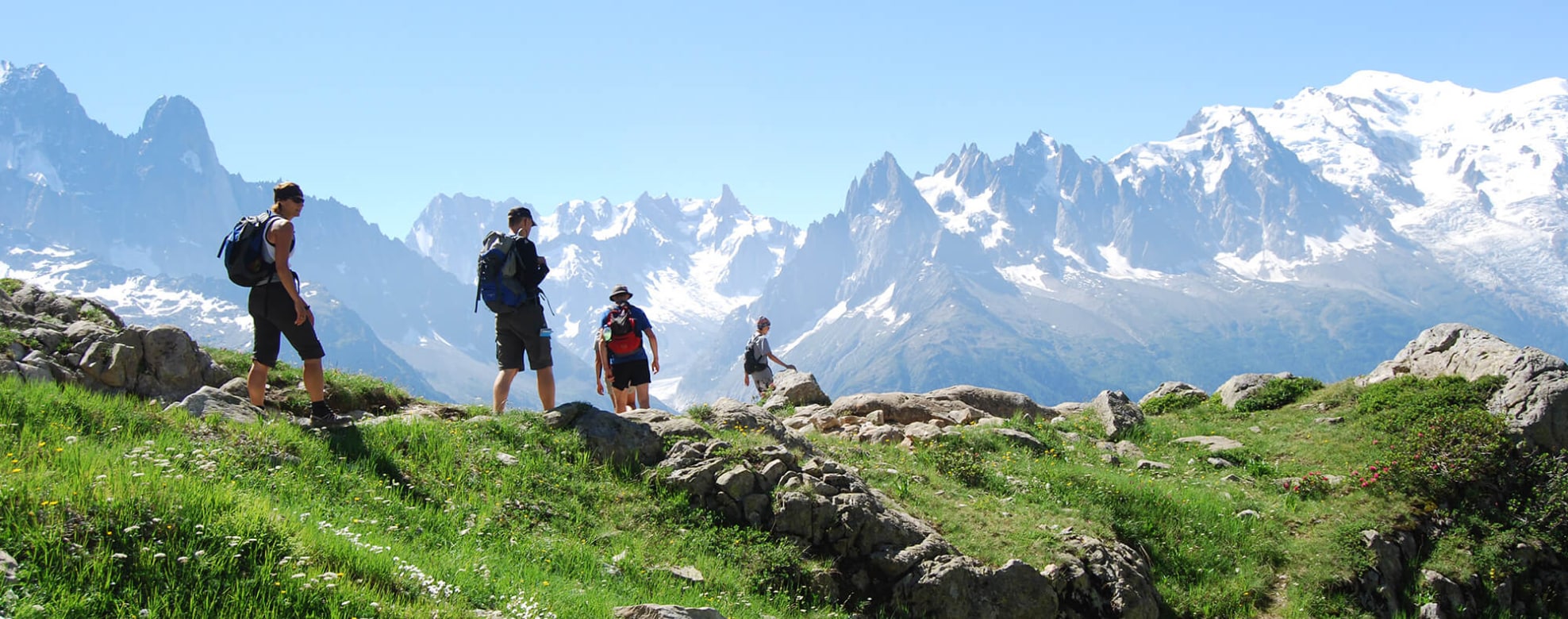
Immerse yourself in the vibrant cultures and cuisines of the French and Spanish Pyrenees on this unforgettable coast-to-coast trek.
View All Points of InterestA Scenic Highlight of the Pyrenees Trek The Gateway to Pyrenean Majesty Superbagnères, a striking geographic feature and ski resort in the French Pyrenees, offers trekkers panoramic views and historical…
Learn moreGateway to the Ordesa Valley A Timeless Alpine Settlement Nestled in the Pyrenees, Torla serves as a gateway to the stunning Ordesa and Monte Perdido National Park. This village captivates…
Learn moreA Gateway to the Pyrenees A Town Where Tradition Meets Adventure Nestled in the Aure Valley of the Hautes-Pyrénées, Saint-Lary-Soulan is both a thriving ski resort and a charming alpine…
Learn moreGeographic Allure of Refugio de Goriz Nestled in the Spanish Pyrenees, Refugio de Goriz stands as a beacon for trekkers and nature enthusiasts. This mountain refuge, situated within the Ordesa…
Learn moreA Jewel of the Pyrenees Discovering Ordesa Canyon on the Pyrenees Trek Ordesa Canyon, located in the Ordesa and Monte Perdido National Park in northeastern Spain, is one of the…
Learn moreReady to explore the world’s most stunning landscapes? Reserve your spot today!

Common questions from Pyrenees Traverse trekkers:
To enjoy the Pyrenees Traverse, you need to be in excellent physical condition with the endurance to hike 15-21km per day for 10 days in a row. You should be comfortable maintaining a steady pace on steep, uneven terrain at elevations up to 2800m. There are significant ascents and descents on most days, so strong legs and a resilient attitude are essential.
This trek is rated a 4 out of 5 (Challenging+) - a step up from classic inn-to-inn treks like the TMB. It has longer distances, bigger elevation changes, and more basic accommodations. You'll be hiking 6-8 hours on most days, and there are no rest days on the itinerary.
To prepare, focus on building your aerobic fitness and leg strength through regular hiking, running, cycling or other cardio. Practice hiking long distances on consecutive days with a weighted pack on hilly trails. Work up to doing a few full-day mountain hikes (6-8 hrs, 15+km, 1000+m elevation change) to simulate a typical day on the trek.
The more hiking-specific training you do, the more you'll enjoy the stunning scenery rather than huffing and puffing! Of course, a positive attitude and sense of adventure are just as important as fitness. The rewards of crossing an entire mountain range on foot are well worth the effort.
The Pyrenees Traverse follows two famous long-distance trails - the GR10 on the French side and the GR11 on the Spanish side. These routes are popular with thru-hikers and generally well-marked and maintained. However, they are real mountain trails with some challenging terrain.
Trail surfaces Expect a variety of trail surfaces underfoot:
No scrambling or rock climbing is required, but there are some exposed sections with drop-offs. Trekking poles are highly recommended for stability and to minimise knee strain.
Elevation The Pyrenees Traverse has over 1000m of elevation gain/loss on most days. The trails feature:
You'll definitely feel the climbs, but they aren't super steep by mountain standards. Aim for a slow, steady pace and take plenty of breaks to drink, snack and enjoy the views!
Water crossings There are several stream and river crossings on the trek, mostly in the first half:
After heavy rains, water levels can rise quickly. Your guide will ensure all crossings are safe and provide assistance if needed. Hiking poles help with balance. Wear quick-drying trail runners or water shoes if you have sensitive feet.
Trail hazards Like any alpine environment, the Pyrenees have some objective hazards to be aware of:
The best defense is wearing appropriate attire, staying alert, and heeding your guide. They will teach you how to hike safely and avoid unnecessary risks.
With common sense and some mountain savvy, the varied terrain of the Pyrenees is a huge highlight of the trek. The exertion makes the jaw-dropping views that much sweeter!
For an authentic taste of Pyrenean trekking culture, this trip features three nights in backcountry mountain refuges (plus one in a village auberge). Staying in these rustic accommodations allows you to experience the most scenic corners of the range without carrying a full pack.
However, refuge life is quite basic compared to hotels. Here's what to expect in terms of sleeping arrangements and bathrooms:
Sleeping
Bathrooms
While the refuge experience is more like an alpine bunkhouse than a hotel, most trekkers find that the incredible locations, social atmosphere and welcome simplicity more than make up for the lack of frills.
You'll be sharing close quarters with fellow hikers from all walks of life, so embrace the communal vibe and pack your sense of adventure along with your ear plugs! Swapping trail stories over hearty Pyrenean dinners and watching the sunset from a refuge terrace are memories you'll treasure long after the trek.
Staying connected with folks back home is trickier in the Pyrenees than more populated mountain areas. The national park is quite remote and crossing borders adds an extra wrinkle. But with a little advance planning, it's still possible to check in a few times during your trek. Here's an overview of your communication options:
Cell Service
To use your own phone, be sure your plan includes international roaming with data for both countries. Charges can add up quickly, so consider buying a prepaid local SIM for more affordable pay-as-you-go rates. You'll need an unlocked phone that accepts international SIMs.
WiFi
When you do find a good connection, take advantage of it to upload photos, answer emails or make a quick video call. But try not to stay glued to your screen - you'll miss soaking in the scenery and socializing with your trek mates!
Satellite Communication If you need to stay in touch for work or family reasons, consider renting or buying a satellite communication device like the Garmin inReach or Somewear Global Hotspot. These palm-sized gadgets let you send and receive texts via satellite from anywhere on Earth. Some models also have GPS tracking and SOS functions for emergencies.
While pricey, satcomms are the only way to relay messages in real-time from deep in the Pyrenean wilderness. They're increasingly popular with guides and thru-hikers for peace of mind in the backcountry.
Protocol Whatever tech setup you choose, we recommend establishing a communication protocol with folks back home before you leave. Let them know your trek dates, a basic itinerary and the level of contact to expect.
With limited WiFi and cell coverage, it's best to plan on checking in every few days when you're in a village or hotel. Manage expectations around response times and emphasize that no news is good news.
Your guide will also have a satellite phone or device for emergencies, and our local office monitors each group's progress along the route. Should something unexpected happen, rest assured we can get in touch with your emergency contacts.
But remember, unplugging from your everyday life and connecting with nature is one of the joys of a multi-day trek. Trust that your guide has everything under control and give yourself permission to live in the moment amidst the Pyrenees' rugged beauty. The emails (and the rest of the world) will be waiting when you finish!
While the Pyrenees Traverse package includes most of your major expenses like accommodations, luggage transfers and many meals, you'll still need to budget for some extras along the way. Here's a rough guide to what costs to expect and how much cash to bring:
Food and drink
Tips
Miscellaneous
We recommend bringing around €350-500 in cash per person to comfortably cover these extras. Euros are accepted everywhere, but it can be tricky to break large bills in small villages. Bring a mix of denominations and try to get change when you can.
ATMs are available in Luchon, St Lary, Gavarnie and Torla but may be out of service or out of cash on weekends. Plan to withdraw a few days' worth of cash at a time rather than relying on ATMs daily.
Credit cards are accepted in most hotels, restaurants and shops, but smaller cafes, refuges and taxis may be cash only. Visa and Mastercard are more widely accepted than American Express.
If you're really worried about running out of cash, consider bringing a backup card or some extra emergency euros just in case. But in general, €350-500 per person is plenty for incidentals on the trek.
Keep in mind that tipping is always optional and should reflect your satisfaction with the services provided. Don't feel obligated to tip if you're unhappy with something, but do let us know so we can address any issues.
It's also a good idea to bring a small amount of local currency for any pre- or post-trek travels in France or Spain. Check exchange rates before you go and allow time to visit a bank or ATM on arrival.
Other potential costs to budget for that are not included in the trek package:
Making a budget (and sticking to it) will help you manage your money on the trek and avoid running out of cash at an inconvenient moment. Making a budget (and sticking to it) will help you manage your money on the trek and avoid running out of cash at an inconvenient moment. Build in a small buffer for unexpected extras and splurges - you are on holiday after all!
Packing for the Pyrenees Traverse involves striking a balance between being prepared for all conditions and not overpacking. Remember, you'll need to carry everything on your back for several days at a time! With strategic layering and multi-use items, you can keep your load light without sacrificing comfort or safety. Here's a suggested packing list:
Luggage
Clothing
Footwear
Gear
Electronics
Documents and Money
Other
A few tips for packing efficiently:
Remember, you'll have luggage transfers on 6 of the 10 hiking days, so you don't need to carry all your gear every day. Bring a few creature comforts for the hotel nights, but keep your refuges nights as minimal as possible.
If you're missing any key items, outdoor shops in Luchon or Gavarnie may have what you need. But it's best to arrive fully equipped so you're not stressed about gear on the trail.
Most importantly, break in your boots and test your backpack on training hikes well before your trip. The best trekking gear is the kind you forget you're wearing because it fits so well!
With savvy packing and a well-fitted pack, you'll barely notice you're carrying your life on your back as you traverse the wild heart of the Pyrenees. The breathtaking scenery will make every ounce worth it.
As a trekker in the spectacular yet fragile Pyrenees, it's crucial to practice responsible tourism and minimise your ecological footprint. The mountains may look rugged, but their ecosystems are surprisingly delicate and vulnerable to human impact. Here are some ways you can tread lightly and protect the environment while trekking:
Follow Leave No Trace principles
Reduce plastic waste
Conserve water and energy
Support local conservation efforts
Choose responsible tour operators
Offset your carbon footprint
The Pyrenees are one of Europe's last great wilderness areas, home to rare species like the brown bear, lammergeier vulture, and izard (Pyrenean chamois). By being a responsible trekker, you're helping to ensure these mountains remain pristine for generations to come.
At Salamander Adventures, we're committed to low-impact, sustainable tourism practices. We work closely with local communities, support conservation initiatives, and educate our trekkers on Leave No Trace ethics. Our hope is that by experiencing the raw beauty of the Pyrenees first-hand, you'll become an advocate for their protection long after your trek ends.
Remember, the mountains are a privilege, not a right. Tread softly, take only photos, leave only footprints, and always strive to leave the Pyrenees better than you found them. Happy (and sustainable) trekking!
The Pyrenees span two countries with proud and distinct cultural traditions - France and Spain. On the Pyrenees Traverse, you'll hike through both French and Spanish Catalonia, Aragon, and Occitania, each with their own unique customs, languages and identities. While the locals are generally welcoming to respectful visitors, it's important to be aware of some key cultural norms to avoid any faux pas along the way.
Language
Greetings
Mealtimes and dining etiquette
Dress code
Festivals and holidays
Hiking etiquette
By following these simple guidelines and respecting local customs, you'll have a much richer and more authentic experience in the Pyrenees. Don't be afraid to try out your French or Spanish, even if it's not perfect - locals appreciate the effort and will often meet you halfway with gestures and a smile.
Remember, you are a guest in these communities and mountains. A little cultural sensitivity goes a long way towards fostering goodwill and leaving a positive impression of trekkers. Embrace the opportunity to learn about Pyrenean traditions and see the world from a different perspective - it's one of the joys of travel!
